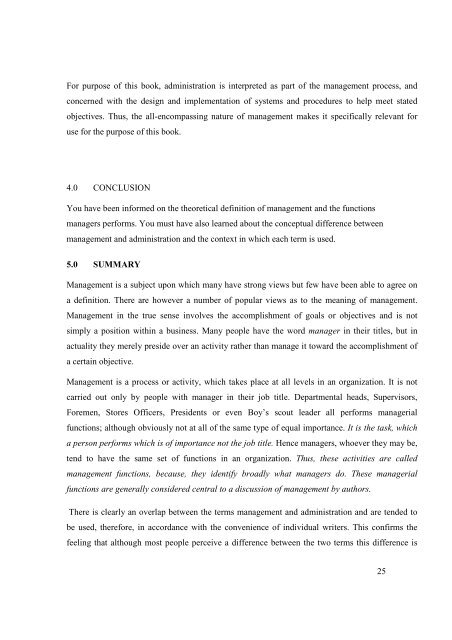HCM 433 MANGEMENT AND ORGANIZATIONAL BEHAVIOUR.pdf
HCM 433 MANGEMENT AND ORGANIZATIONAL BEHAVIOUR.pdf
HCM 433 MANGEMENT AND ORGANIZATIONAL BEHAVIOUR.pdf
You also want an ePaper? Increase the reach of your titles
YUMPU automatically turns print PDFs into web optimized ePapers that Google loves.
For purpose of this book, administration is interpreted as part of the management process, and<br />
concerned with the design and implementation of systems and procedures to help meet stated<br />
objectives. Thus, the all-encompassing nature of management makes it specifically relevant for<br />
use for the purpose of this book.<br />
4.0 CONCLUSION<br />
You have been informed on the theoretical definition of management and the functions<br />
managers performs. You must have also learned about the conceptual difference between<br />
management and administration and the context in which each term is used.<br />
5.0 SUMMARY<br />
Management is a subject upon which many have strong views but few have been able to agree on<br />
a definition. There are however a number of popular views as to the meaning of management.<br />
Management in the true sense involves the accomplishment of goals or objectives and is not<br />
simply a position within a business. Many people have the word manager in their titles, but in<br />
actuality they merely preside over an activity rather than manage it toward the accomplishment of<br />
a certain objective.<br />
Management is a process or activity, which takes place at all levels in an organization. It is not<br />
carried out only by people with manager in their job title. Departmental heads, Supervisors,<br />
Foremen, Stores Officers, Presidents or even Boy’s scout leader all performs managerial<br />
functions; although obviously not at all of the same type of equal importance. It is the task, which<br />
a person performs which is of importance not the job title. Hence managers, whoever they may be,<br />
tend to have the same set of functions in an organization. Thus, these activities are called<br />
management functions, because, they identify broadly what managers do. These managerial<br />
functions are generally considered central to a discussion of management by authors.<br />
There is clearly an overlap between the terms management and administration and are tended to<br />
be used, therefore, in accordance with the convenience of individual writers. This confirms the<br />
feeling that although most people perceive a difference between the two terms this difference is<br />
25
















